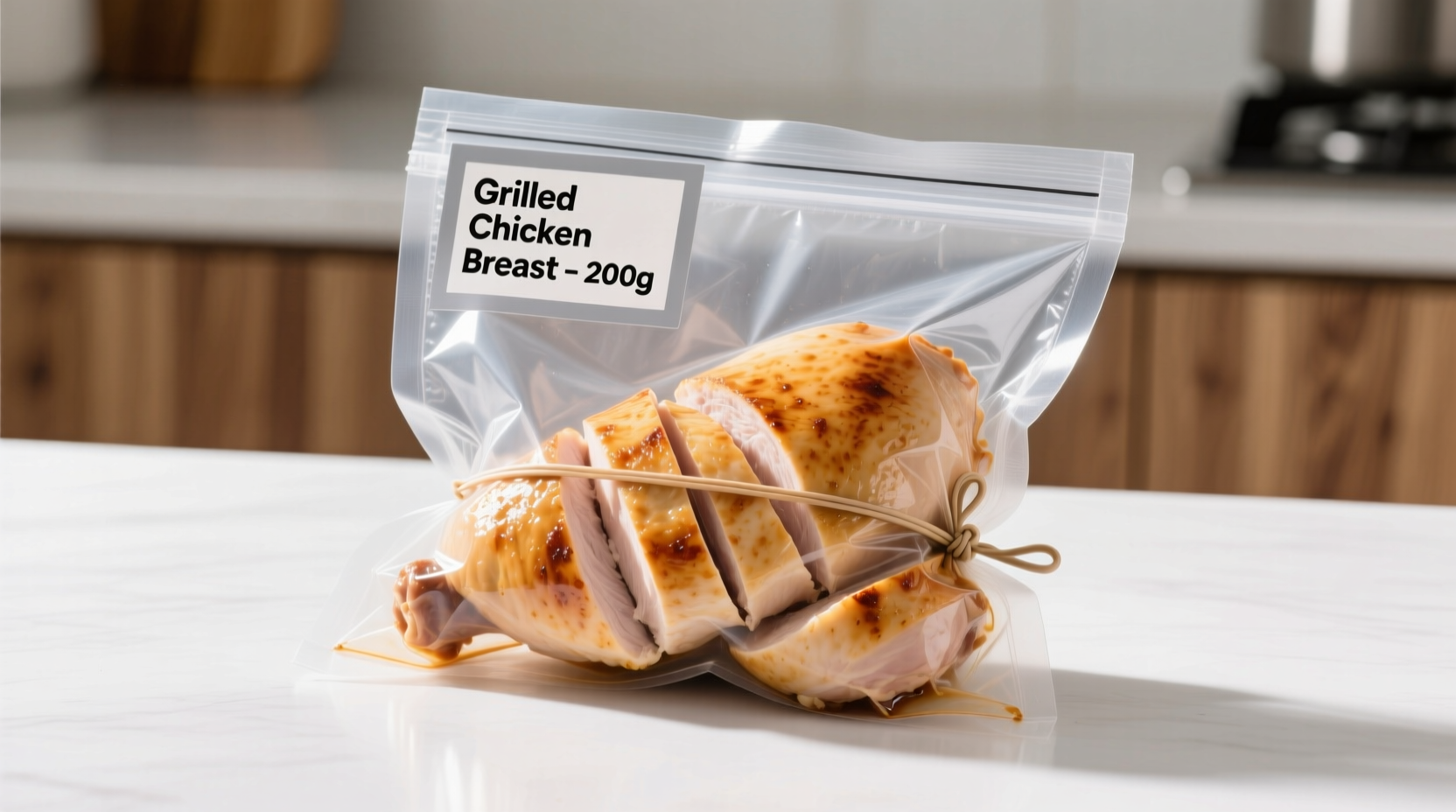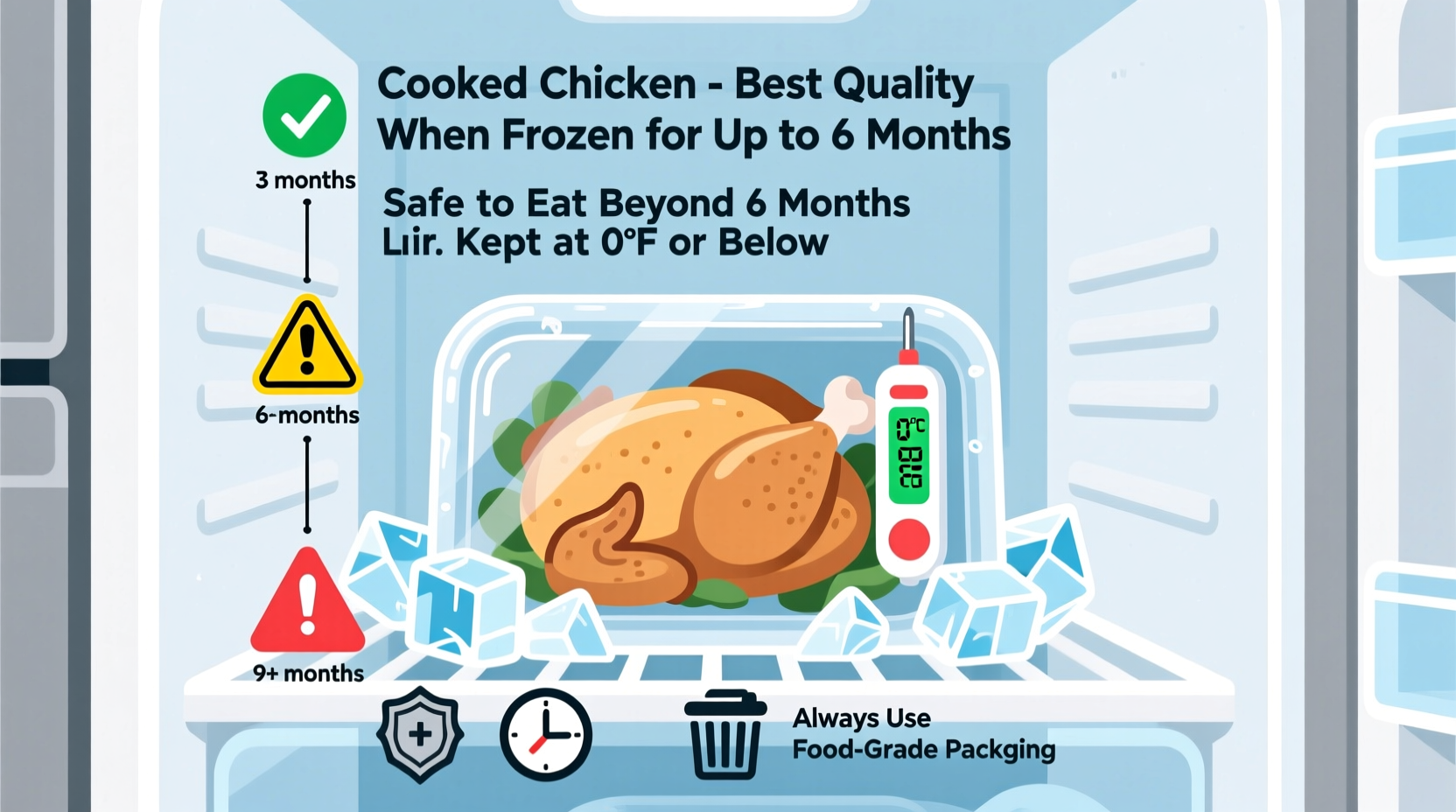The Science Behind Frozen Cooked Chicken Safety
Understanding why cooked chicken has a recommended storage timeframe requires knowing the difference between food safety and food quality. At proper freezer temperatures (0°F/-18°C or below), bacterial growth stops completely, making frozen food safe indefinitely from a food safety perspective.
However, quality degradation occurs over time due to:
- Enzyme activity - continues at slow rates even in freezing conditions
- Moisture loss - leads to texture changes and freezer burn
- Oxidation - causes flavor changes and potential rancidity
| Storage Duration | Quality Status | Safety Status |
|---|---|---|
| 1-2 months | Excellent flavor and texture | Safe |
| 2-4 months | Good quality, minor texture changes | Safe |
| 4-6 months | Noticeable quality decline | Safe if properly stored |
| 6+ months | Significant quality loss | Safe but quality compromised |
Maximizing Your Cooked Chicken's Freezer Life
How you package cooked chicken before freezing determines how long it maintains good quality. Follow these professional kitchen techniques:
Proper Packaging Methods
- Air removal is critical - Use vacuum sealers or the water displacement method for zip-top bags
- Portion control - Freeze in meal-sized portions to avoid repeated thawing
- Double protection - Wrap portions in freezer paper first, then place in containers
- Label everything - Include contents and freezing date using freezer-safe markers

Freezer Organization Best Practices
Professional kitchens maintain strict freezer organization to ensure first-in-first-out usage:
- Store newer items behind older ones
- Keep cooked chicken separate from raw proteins
- Maintain consistent 0°F (-18°C) temperature (use a dedicated freezer thermometer)
- Avoid overfilling to allow proper air circulation
Recognizing When Frozen Cooked Chicken Has Declined in Quality
While frozen chicken remains safe indefinitely, these signs indicate quality has deteriorated beyond acceptable levels:
Visual Indicators of Quality Loss
- Excessive ice crystals - More than a light frost coating
- Discoloration - Grayish or dull appearance after thawing
- Freezer burn - Dry, leathery patches that are white, gray, or brown
Texture and Flavor Changes
When properly thawed, check for:
- Unpleasant odors (should only have mild cooked chicken aroma)
- Excessively dry or rubbery texture
- Sour or "off" flavors
Remember: Freezer burn affects quality but not safety. Simply trim affected areas before cooking.
Safe Thawing and Reheating Procedures
How you thaw and reheat frozen cooked chicken impacts both safety and quality:
Recommended Thawing Methods
- Refrigerator thawing (best method) - 24 hours per 4-5 pounds
- Cold water method - Submerge sealed package in cold water, changing water every 30 minutes
- Microwave thawing - Use defrost setting and cook immediately after thawing
Never thaw cooked chicken at room temperature - this allows bacteria to grow in the danger zone (40°F-140°F/4°C-60°C).
Reheating for Best Results
Always reheat to an internal temperature of 165°F (74°C):
- Add moisture when reheating (broth, sauce) to compensate for freezer moisture loss
- Cover when reheating to retain moisture
- Reheat only the portion you'll consume immediately
- Consume within 2 hours of reheating
Special Considerations for Different Chicken Preparations
Cooked chicken storage times vary slightly based on preparation method and ingredients:
| Preparation Type | Recommended Freezer Time | Special Considerations |
|---|---|---|
| Plain roasted or grilled | 4 months | Best quality retention |
| Chicken in sauce or gravy | 2-3 months | Sauces may separate after longer storage |
| Breaded chicken | 2 months | Breading becomes soggy more quickly |
| Chicken salad or mixed dishes | 2-3 months | Mayo-based salads have shorter freezer life |
These variations occur because additional ingredients introduce different moisture levels and chemical compositions that affect freezer stability. For example, chicken salad with mayonnaise has a shorter freezer life because the emulsion breaks down over time.
Common Questions About Freezing Cooked Chicken
These frequently asked questions address specific concerns home cooks encounter when storing cooked chicken:











 浙公网安备
33010002000092号
浙公网安备
33010002000092号 浙B2-20120091-4
浙B2-20120091-4